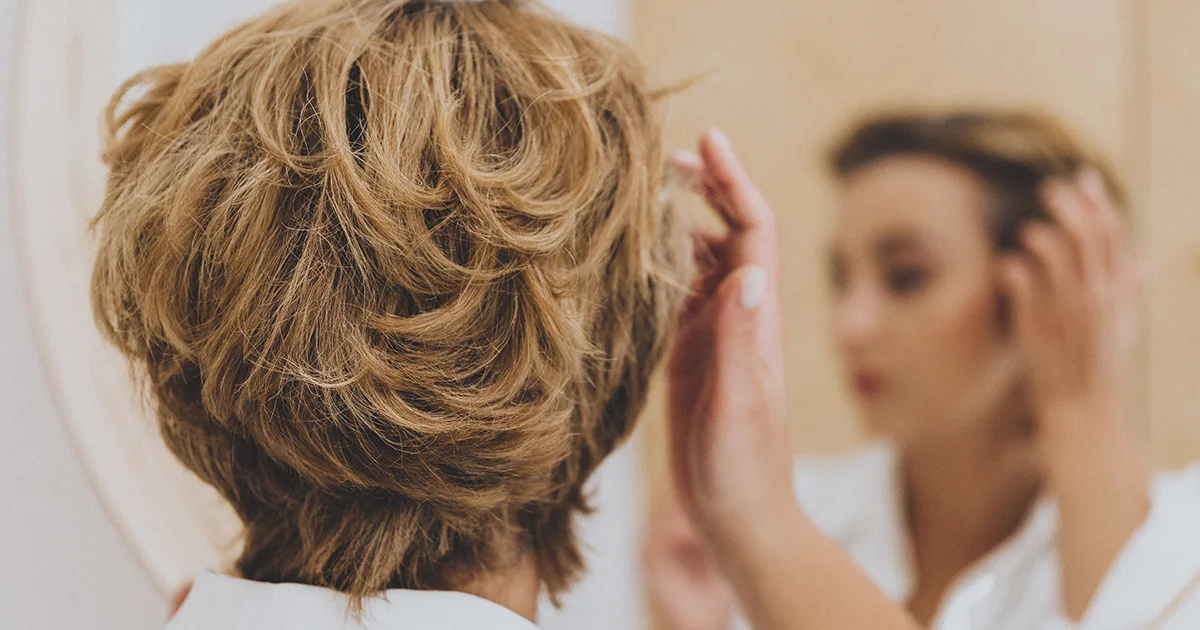Here's what we'll cover
Here's what we'll cover
If you’re taking gabapentin and notice your hair is shedding, it could be linked to the medication. Gabapentin is one of many drugs that can have hair loss as a side effect, though it’s not common. Here’s a look at why it happens and how to combat drug-induced hair loss.
What is gabapentin?
Gabapentin (brand name Neurontin) is an anticonvulsant medication used to control nerve pain and help with seizures. It works by reducing the excitability of neurons (nerve cells) in the brain to control seizures and nerve pain (Yasaei, 2022).
Gabapentin is approved by the US Food and Drug Administration (FDA) as an anti-seizure medication to treat epilepsy, postherpetic neuralgia (nerve pain from shingles), and restless leg syndrome. It’s also prescribed off-label for an increasing number of conditions including (Yasaei, 2022):
Neuropathic pain
Fibromyalgia
Hot flashes
Insomnia
Irritable bowel syndrome
Does gabapentin cause hair loss?
Though not a common side effect, gabapentin may infrequently cause alopecia (hair loss) in some people.
It can also have the opposite effect, resulting in hair growth (hirsutism) and dermatological conditions like eczema and dry skin. Other antiepileptic drugs have a higher likelihood of hair loss than gabapentin (FDA, n.d.; Wang, 2019).
Side effects of gabapentin
Like all medications, gabapentin comes with a risk for side effects. Aside from the uncommon adverse effect of hair loss, here are some others the drug may cause (MedlinePlus, 2020; Yasaei, 2022):
Fatigue or drowsiness
Dizziness
Headaches
Memory loss
Swelling of the hands and feet (edema)
Weight gain
Blurred vision
Unsteadiness or shaking
Nausea or vomiting
Nystagmus (involuntary eye muscle movements)
Suicidal thoughts
Some people experience serious breathing problems, especially if taking gabapentin with central nervous system depressants like opioids (FDA, 2019). If you experience signs of an allergic reaction like itching, swelling in the face, or difficulty breathing, see a healthcare professional right away (MedlinePlus, 2020).
Other medications linked to hair loss
There are quite a few medications that trigger hair loss. Most of the time, drug-induced hair shedding reverses, and hair regrows after the medication is stopped. This doesn’t include the full list, but here are some drug types linked to hair loss (Hughes, 2021; Etminan, 2018; Watanabe, 2019):
Anticoagulants (blood thinners)
Blood pressure medications
Chemotherapy
Oral contraceptives (birth control pills)
Types of medication-induced hair loss
When a medication triggers hair loss, it usually occurs within three months of starting it. This varies based on the drug, dosage, and any sensitivities you may have. Usually, medication-induced hair loss falls into two different categories: telogen effluvium or anagen effluvium. These are based on three stages of hair growth: (Hughes, 2021).
Anagen (growth)
Catagen (transition)
Telogen (resting)
Medications like gabapentin are thought to affect primarily telogen hairs. There are far fewer telogen hairs (about 15%) on the head at any given time. That’s why telogen effluvium hair loss is more gradual and usually leads to thinning rather than baldness (Hughes, 2021). Telogen effluvium is often temporary and can be caused by other factors including illness, vitamin deficiencies, psychological stress, and weight loss (Patel, 2013).
Will hair grow back after stopping gabapentin?
In most cases, stopping a medication will result in eventual hair regrowth. Hair regrowth is usually noticed within 3–6 months but can sometimes take longer to fully recover your original hair. Sometimes it doesn’t all grow back (Hughes, 2021).
It’s important to avoid abruptly stopping a prescribed drug without medical advice. Some medications (including gabapentin) require slow discontinuation as serious side effects like seizures can occur if you stop too rapidly (FDA, n.d.).
If you think any recent hair loss is linked to a medication you’re taking, a healthcare provider may recommend stopping the drug for three or more months and offer an alternative if one is available.
How to reverse hair loss from medication
If your hair isn’t regrowing or taking longer than expected, there are treatments that can stimulate new growth. Research shows that minoxidil (Rogaine) helps increase blood flow to affected hair follicles, boosting nutrient delivery and new hair growth (Badri, 2021).
Along with treatment, it’s important to discuss and address any underlying health conditions with your provider.
Oral Minoxidil Important Safety Information: Read more about serious warnings and safety info.
DISCLAIMER
If you have any medical questions or concerns, please talk to your healthcare provider. The articles on Health Guide are underpinned by peer-reviewed research and information drawn from medical societies and governmental agencies. However, they are not a substitute for professional medical advice, diagnosis, or treatment.
Badri, T., Nessel, T., & Kumar, D. (2021). Minoxidil. StatPearls. Retrieved June 7, 2022 from https://www.ncbi.nlm.nih.gov/books/NBK482378/
Centers for Disease Control and Prevention (CDC). (2022). Notes from the field: Trends in gabapentin detection and involvement in drug overdose deaths - 23 states and the District of Columbia, 2019–2020 . Retrieved from https://www.cdc.gov/mmwr/volumes/71/wr/mm7119a3.htm
Chen, B., Choi, H., Hirsch, L. J., et al. (2015). Cosmetic side effects of antiepileptic drugs in adults with epilepsy. Epilepsy & Behavior, 42, 129–137. doi:10.1016/j.yebeh.2014.10.021. Retrieved from https://pubmed.ncbi.nlm.nih.gov/25513768/
Dyall-Smith, D. (2009). Alopecia from drugs. Retrieved from https://dermnetnz.org/topics/alopecia-from-drugs
Eker, H. E., Cok, O. Y., & Aribogan, A. (2009). Alopecia associated with gabapentin in the treatment of neuropathic pain. Journal of Pain and Symptom Management, 37 (3). doi:10.1016/j.jpainsymman.2008.09.001. Retrieved from https://www.jpsmjournal.com/article/S0885-3924(08)00650-7/fulltext
Etminan, M., Sodhi, M., Procyshyn, R. M., et al. (2018). Risk of hair loss with different antidepressants: a comparative retrospective cohort study. International Clinical Psychopharmacology, 33 (1), 44–48. doi:10.1097/YIC.0000000000000191. Retrieved from https://pubmed.ncbi.nlm.nih.gov/28763345/
Honarmand, A., Safavi, M., & Zare, M. (2011). Gabapentin: An update of its pharmacological properties and therapeutic use in epilepsy. Journal of Research in Medical Sciences . Retrieved from https://www.ncbi.nlm.nih.gov/pmc/articles/PMC3263084/
Hughes, E. & Saleh, D. (2021). Telogen effluvium. StatPearls . Retrieved June 7, 2022 from https://www.ncbi.nlm.nih.gov/books/NBK430848/
MedlinePlus. (2020). Gabapentin: Medlineplus drug information . Retrieved from https://medlineplus.gov/druginfo/meds/a694007.html
Patel, M., Harrison, S., & Sinclair, R. (2013). Drugs and hair loss. Dermatologic Clinics , 31 (1), 67–73. doi:10.1016/j.det.2012.08.002. Retrieved from https://www.sciencedirect.com/science/article/abs/pii/S0733863512000903?via%3Dihub
US Food and Drug Administration (FDA). (2019). FDA warns about serious breathing problems with seizure and nerve pain medicines gabapentin (Neurontin, Gralise, Horizant) and pregabalin (Lyrica, Lyrica CR). Retrieved from https://www.fda.gov/drugs/drug-safety-and-availability/fda-warns-about-serious-breathing-problems-seizure-and-nerve-pain-medicines-gabapentin-neurontin#:~:text=FDA%20is%20warning%20that%20serious,problems%2C%20or%20in%20the%20elderly
US Food and Drug Administration (FDA). (n.d.). Neurontin (gabapentin) capsules label . Retrieved from https://www.accessdata.fda.gov/drugsatfda_docs/label/2010/020235s043lbl.pdf
Wang, X., Wang, H., Xu, D., et al. (2019). Risk of valproic acid-related alopecia: A systematic review and meta-analysis. Seizure, 69, 61–69. doi:10.1016/j.seizure.2019.04.003. Retrieved from https://pubmed.ncbi.nlm.nih.gov/30981051/
Watanabe, T., Yagata, H., Saito, M., et al. (2019). A multicenter survey of temporal changes in chemotherapy-induced hair loss in breast cancer patients. PLOS One , 14 (1). doi:10.1371/journal.pone.0208118. Retrieved from https://www.ncbi.nlm.nih.gov/pmc/articles/PMC6326423/
Yasaei, R., Katta, S., & Saadabadi, A. (2022). Gabapentin. StatPearls . Retrieved June 7, 2022 from https://www.ncbi.nlm.nih.gov/books/NBK493228/










